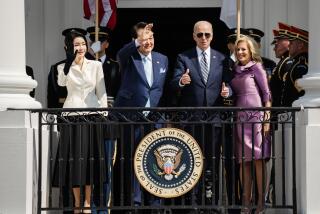North Korea’s nuclear program tops U.S. envoy’s agenda
- Share via
Reporting from Seoul — U.S. envoy Stephen Bosworth arrived in South Korea on Tuesday expressing hope for the resumption of long-stalled negotiations over North Korea’s increasingly worrisome nuclear program.
Bosworth, launching a northeast Asian tour that is to include stops in China and Japan, planned to meet Wednesday with key South Korean Foreign Ministry officials.
Both Koreas recently have made conciliatory gestures after weeks of tension that included the North’s artillery shelling in November of a front-line island that killed four people.
South Korean President Lee Myung-bak said this week that his nation was ready to cooperate with Kim Jong Il’s isolationist regime if it made serious moves to dismantle its nuclear program, which he called an “enormous threat” to peace in the region.
Bosworth echoed those sentiments upon his arrival in Seoul. “We believe that serious negotiations must be at the heart of any strategy for dealing with North Korea,” he said, “and we look forward to being able to launch those at a reasonably early time.”
After huddling with officials in South Korea, Bosworth planned to leave for meetings with Communist Party officials in Beijing, North Korea’s chief ally.
In the lead-up to a meeting this month between the Chinese and U.S. presidents in Washington, Beijing has called for North Korea’s return to the so-called six-party denuclearization talks, which include China, South Korea, Japan, Russia and the U.S.
But after months of tension that also included the North’s alleged torpedoing of a South Korean warship in March, which killed 46 crewmen, Obama administration officials called for concrete steps from Pyongyang showing that it really wanted peace before the U.S. would agree to join the regime at multilateral talks.
Both the U.S. and South Korea want the North to halt its nuclear development and allow international nuclear monitors back into the secretive nation.
In the past, North Korea, which has endured repeated famine and crop failure, has benefited from its participation in the nuclear talks — receiving substantial aid from the South. But Pyongyang nonetheless deserted the talks two years ago and later carried out a nuclear test, its second since 2006.
North Korea recently indicated its willingness to resume negotiations. In a message issued on New Year’s Day, Pyongyang stressed its desire for improved relations and dialogue with South Korea and said it wanted a Korean peninsula free of nuclear weapons.
Bosworth said his mission was to coordinate the restart of the talks, adding that he arrived with no new U.S. incentives to coax the North back to the table.
“We are here primarily to consult and coordinate,” he said. “I expect to do more listening than talking.”
He added that Washington and Beijing “share a large number of common interests around the world and in the region and particularly on the Korean peninsula.”
Bosworth said the U.S. “will continue to coordinate very closely with the Chinese as we move forward.”
More to Read
Sign up for Essential California
The most important California stories and recommendations in your inbox every morning.
You may occasionally receive promotional content from the Los Angeles Times.











